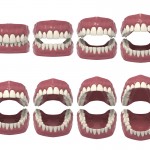
Occlusal schemes for complete dentures may influence clinical performance and patient satisfaction. Patient characteristics such as alveolar ridge shape and height also influence choice of scheme. There are several schemes to choose from including bilateral balanced, lingualised, canine guidance, group function, and monoplane. A number of studies and reviews have been conducted but a consensus on an ideal occlusal scheme if lacking.
The aim of this overview was to assess the methodological quality and summarize the scientific evidence from secondary studies about the influence of occlusal schemes on the clinical performance of and patient satisfaction with complete dentures.
Methods
A protocol for the review was registered with PROSPERO. Searches were carried out in the Cochrane Library, PubMed, Embase, LILACS, Scopus, the Web of Science, PROSPERO, Google Scholar and Open Science Framework databases. Systematic reviews that included randomized or non-randomized clinical trials evaluating conventional complete dentures with different occlusion schemes on clinical performance and patient satisfaction were considered. Two reviewers independently selected studies and extracted data with disagreements being resolved by a third reviewers. The AMSTAR 2 tool was used to assess the quality of the reviews. The effect of each occlusal scheme in comparison with others was summarized and classified as positive, neutral, negative, or inconclusive based on the conclusions of the systematic review concerning clinical performance and patient satisfaction outcomes.
Results
- 10 systematic reviews were included.
- All 10 reviews included randomised controlled trials (RCTs) 5 also included prospective studies, 2 included other systematic reviews, 2 included clinical studies involving partial dentures or implants.
- No meta-analyses were presented in any of the 10 reviews.
- Confidence in the reviews was rated as critically low for 7 reviews, low for 2 reviews and moderate for one review using the AMSTAR 2 tool.
- Summary suggested that occlusal schemes may influence objective and subjective clinical performance and patients’ satisfaction.
Conclusions
The authors concluded: –
..occlusal schemes might interfere with the clinical performance of and patient satisfaction with complete dentures. Lingualized, bilateral balanced, and canine guidance are preferred compared with monoplane occlusion, but lingualized occlusion tends to show better results in some reviews. However, the results should be carefully considered because of the low quality of the systematic reviews included.
Comments
The authors have searched a broad range of databases including review that included RCTs and other study designs. Ten reviews were included in this overview of systematic reviews of these we have previously commented on two (Dental Elf – 9th Feb 2018, Dental Elf – 5th Sep 2013) a third review included was published by the Cochrane collaboration (Sutton et al., 2005) but this has since been withdrawn by them as it is out of date and does not meet current Cochrane methodological standards. The authors of this overview used the validated AMSTAR 2 tool to assess the quality of the included reviews and it was Sutton’s Cochrane review which had the best confidence rating. While this overview provides a good summary of the available systematic review and provides a useful discussion it could have been improved if some consideration of the degree of the overlapping of studies in the reviews was included. For example, the review we looked at in 2013 (Dental Elf – 5th Sep 2013) included 7 RCTs while the 2018 review (Dental Elf – 9th Feb 2018) included 11 RCTs and 6 prospective studies with 5 RCTs being common to both reviews. While the most recent review included in this overview (Ahmed et al, 2021) has 4 of its 18 included studies in common with the 2018 review (Dental Elf – 9th Feb 2018). Most of the studies included in the reviews are small with few being randomised. Well designed and reported studies of appropriate size using common outcomes sets are needed to clarify the best occlusal schemes for complete dentures.
Links
Primary Paper
Borges MHR, Miranda LFB, Dini C, Marañón-Vásquez GA, Magno MB, Maia LC, Barão VAR. Clinical performance of and patient satisfaction with conventional complete dentures with different occlusal schemes: A systematic review of systematic reviews. J Prosthet Dent. 2022 Jan 3:S0022-3913(21)00591-6. doi: 10.1016/j.prosdent.2021.10.018. Epub ahead of print. PMID: 34991859.
Other references
Dental Elf – 9th Feb 2018
Dental Elf – 5th Sep 2013
Sutton AF, Glenny AM, McCord JF. Interventions for replacing missing teeth: denture chewing surface designs in edentulous people. Cochrane Database of Systematic Reviews 2005, Issue 1. Art. No.: CD004941. DOI: 10.1002/14651858.CD004941.pub2.
Ahmed,N.;Humayun, M.A.; Abbasi, M.S.; Jamayet, N.B.; Habib, S.R.; Zafar, M.S. Comparison of Canine-Guided Occlusion with Other Occlusal Schemes in Removable Complete Dentures: A Systematic Review. Prosthesis 2021, 3, 85–98. https:// doi.org/10.3390/prosthesis3010009
